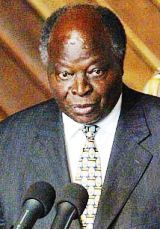Kenya demands Sudan’s help to end political crisis
January 6, 2007 (KHARTOUM) — Sudan has received a demand from the Kenya asking to intervene in order to persuade the chief of the Kenyan opposition to accept a peaceful settlement to the ongoing political crisis in the neighbouring country.

Opposition leader Raila Odinga, who had appeared on course to win the vote until Mwai Kibaki was handed a narrow victory last Sunday, rejects a proposal to form a national unity government to end Kenya’s crisis. He says the election was rigged. International observers say the election fell short of democratic standards.
The Sudanese foreign minister received a demand from his Kenyan counterpart to meet the Sudanese president and to deliver a message from President Mwai Kibaki to President Omer al-Bashir asking him to convince the opposition leader to accept political solution and to stop violence in the countryt.
Raila Odinga, who received financial support from Khartoum to conduct his electoral campaign, has good relations with the ruling National Congress Party. Before the elections, Kibaki supporter criticised Odinga for pushing Kenya to import Sudanese oil in 2001 when he was minister for energy.
The then minister of energy, who visited Khartoum at that time for the oil deal, was accused of supporting Sudanese government by allowing the importation of “blood oil” from Sudan. However Odinga had to retreat when he was criticised by the Kenyan parliament.
Sudan welcomed the Kenyan demand but demanded a delay to prepare for the visit.
Odinga helped Kibaki win power in a 2002 election, but says the president broke a promise to award him a new prime minister’s position after the victory. Their mutual distrust is a key obstacle to ending the standoff.
U.S. Assistant Secretary of State for African Affairs Jendayi Frazer Sunday shuttled between both camps in a bid to unblock the stalemate, with South African Nobel peace laureate Desmond Tutu also taking part in the negotiations.
The Kenyan crisis has had an impact beyond Kenya’s borders, with fuel shortages disrupting transport and trade in Uganda, southern Sudan, Rwanda and the eastern Democratic Republic of Congo.
More than 360 people died in violence linked to the December 27 poll and aid groups warned of a humanitarian crisis after the displacement of some 250,000 people, particularly in the west of the country and the capital’s slums.
(ST)
